In an effort to tackle the issue of rowdy tourists, Prague has taken a controversial step by banning organised night-time pub crawls between 22:00 and 06:00. This decision is aimed at reducing the disruptive behaviour that has plagued the city, particularly in areas popular with tourists. However, critics argue that this approach unfairly punishes responsible drinkers for the actions of a small, disorderly group.
The new ban, which targets pub crawls organised by travel agencies, is part of a broader effort to change the city’s image. According to Deputy Mayor Jiri Pospisil, Prague aims to attract a more “refined” crowd, with a focus on respect for shared public spaces. Pospisil stressed that the authorities want the Czech capital to be a place where tourism and local life coexist in harmony, prioritising quiet and safety over excessive partying. But is this the right way to go about it?
The Impact on Tourism
Prague’s decision mirrors similar actions taken in other European cities. For example, Amsterdam recently launched a campaign specifically aimed at discouraging British tourists from travelling to the city for excessive drinking and drug use. These moves highlight a growing trend across the continent to shift away from a party-centric tourism model. While the intention is to improve the quality of life for locals and maintain the charm of the city, there are concerns that such bans may have unintended consequences.
The decision by Prague’s City Council was based on noise, safety, and cleanliness concerns, particularly in the central Prague One district, a UNESCO World Heritage Site. Crowds of intoxicated tourists roaming the streets have been blamed for a rise in public disturbances, forcing the city to increase police patrols and cleaning services. These excessive demands have strained local resources, leading to the introduction of the pub crawl ban.
However, many argue that a blanket ban on all night-time pub crawls is an overreaction. Vaclav Starek, from the Czech Association of Hotels and Restaurants, stated that while he supports the move to control unruly behaviour, it will not significantly affect business. “Nobody will be banned from going to a pub, but these nightly organised pub crawls… are nothing we would need,” Starek said. But could this be a case of missing the larger issue?
A Populist Move or a Practical Solution?
The pub crawl organisers have been quick to voice their disapproval, labelling the decision as “merely a populist move”. According to Prague Pub Crawl, this ban is an attempt to distract from the city management’s failure to address more pressing issues, such as the shortage of municipal police to enforce public order. This sentiment is echoed by some locals who feel that the root cause of the problem—poor law enforcement—has not been sufficiently addressed.
Indeed, while the city has benefitted from a booming tourism industry, with 7.4 million visitors in 2023 alone, the effects on locals have been less than positive. Chronic noise, especially in densely populated areas like the Old Town, has become a significant problem. Stepan Kuchta, a Prague resident, told The Times that his health has been “ruined by chronic noise,” highlighting the real-world impact of excessive tourism.
An Unfair Punishment for All?
While it’s understandable that Prague wants to preserve its cultural heritage and offer a better quality of life for its residents, this decision to ban night-time pub crawls raises important questions about how cities should handle tourism-related issues. Is it fair to impose a blanket restriction because of the behaviour of a small, disrespectful group? Should responsible tourists suffer for the actions of a few?
For many visitors, the nightlife in Prague is a significant part of its appeal. The combination of historic charm and affordable beer has made the city a top destination for stag and hen parties. Banning organised pub crawls could deter not just rowdy tourists but also those who come to enjoy the vibrant bar scene in a responsible manner.
Prague’s move to ban organised night-time pub crawls is an attempt to address legitimate concerns around noise, safety, and the city’s reputation. However, the decision may be seen as regressive, penalising all tourists for the actions of a disruptive few. While the authorities aim to attract a more refined visitor base, they must ensure that the city’s nightlife and tourism sectors do not suffer as a result.
